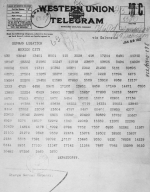maria
New member
- Joined
- Oct 3, 2006
- Messages
- 17
- Best answers
- 0
How a Secret Diplomatic Communication Changed History
The Zimmermann Telegram (or Zimmermann Note or Zimmerman Cable) was a secret diplomatic communication issued from the German Foreign Office in January 1917. This diplomatic communication proposed a military alliance between Germany and Mexico if the United States entered World War I against Germany. With Germany's aid, Mexico would recover Texas, Arizona, New Mexico, and California which it had lost during the 1840s. This telegram was intercepted and decoded by British intelligence. In this article we will explore the impact of this telegram on World War I and why it is considered one of the most important documents in history.

The Context of the Telegram, Now Called the Zimmermann Telegram
The Zimmermann Telegram was sent shortly after the declaration of unrestricted submarine warfare by Germany on February 1st, 1917. This announcement was seen as a direct challenge to President Woodrow Wilson’s intention to keep American out of WWI. As a result, tensions between the US and Germany were becoming increasingly strained. In response to this tension and in an effort to gain an ally, Arthur Zimmerman sent this telegram proposing an alliance between Germany and Mexico should war break out with America.
The Impact of the Telegram
The telegram also had a significant psychological effect on the American people. When British intelligence intercepted and decoded the telegram, it caused an uproar in both Britain and America. This type of secret diplomatic communication had never before been discovered in such detail. The contents of this message served to galvanize public opinion in America towards entering WWI on Allied side as they believed that their sovereignty was being threatened by this potential alliance between two hostile countries. As a result, President Wilson declared war on April 6th 1917 which ultimately led to US winning WWI alongside Britain and France against Germany.
The Legacy of the Telegraph
This incident has since become one of most iconic symbols of how diplomacy can be used to sway public opinion as well as how technological developments can shape international relations. It also serves as reminder that even though our world is now more connected than ever before through technology we still need use diplomacy wisely so that our actions don’t have unintended consequences for global peace and security . In addition , it shows us how small decisions can have huge implications for world politics .
The Zimmermann Telegram (or Zimmermann Note or Zimmerman Cable) was a secret diplomatic communication issued from the German Foreign Office in January 1917. This diplomatic communication proposed a military alliance between Germany and Mexico if the United States entered World War I against Germany. With Germany's aid, Mexico would recover Texas, Arizona, New Mexico, and California which it had lost during the 1840s. This telegram was intercepted and decoded by British intelligence. In this article we will explore the impact of this telegram on World War I and why it is considered one of the most important documents in history.

The Context of the Telegram, Now Called the Zimmermann Telegram
The Zimmermann Telegram was sent shortly after the declaration of unrestricted submarine warfare by Germany on February 1st, 1917. This announcement was seen as a direct challenge to President Woodrow Wilson’s intention to keep American out of WWI. As a result, tensions between the US and Germany were becoming increasingly strained. In response to this tension and in an effort to gain an ally, Arthur Zimmerman sent this telegram proposing an alliance between Germany and Mexico should war break out with America.
The Impact of the Telegram
The telegram also had a significant psychological effect on the American people. When British intelligence intercepted and decoded the telegram, it caused an uproar in both Britain and America. This type of secret diplomatic communication had never before been discovered in such detail. The contents of this message served to galvanize public opinion in America towards entering WWI on Allied side as they believed that their sovereignty was being threatened by this potential alliance between two hostile countries. As a result, President Wilson declared war on April 6th 1917 which ultimately led to US winning WWI alongside Britain and France against Germany.
The Legacy of the Telegraph
This incident has since become one of most iconic symbols of how diplomacy can be used to sway public opinion as well as how technological developments can shape international relations. It also serves as reminder that even though our world is now more connected than ever before through technology we still need use diplomacy wisely so that our actions don’t have unintended consequences for global peace and security . In addition , it shows us how small decisions can have huge implications for world politics .

